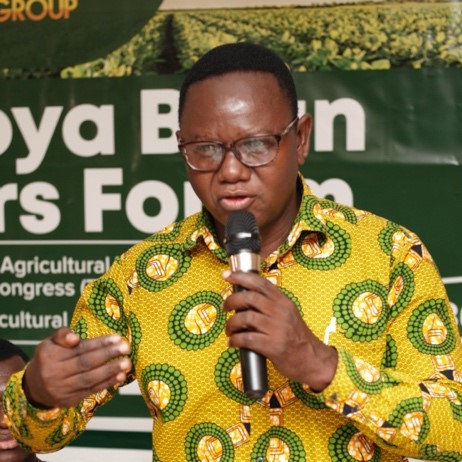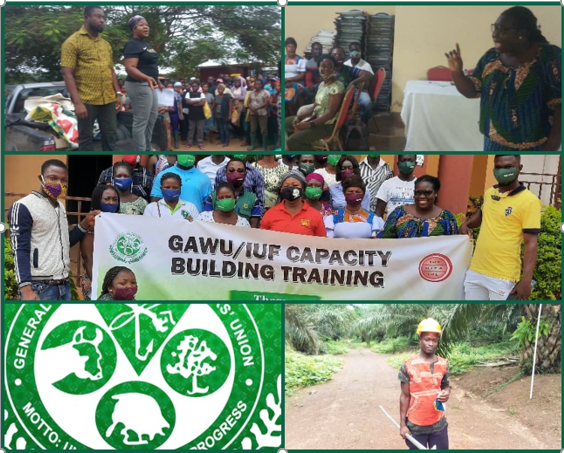What is GAWU?
Ghana’s General Agricultural Workers’ Union (GAWU) is the nation’s biggest trade union, organising farmers and agricultural workers in both the formal and informal sectors of our country. GAWU has been working with smallholder farmers and other non-wage rural workers since formation on the 9th of February 1959.
We are currently working in over 200 communities across all the regions of Ghana. The Union is non-partisan and hence not affiliated to any political party in Ghana. The ultimate goal of GAWU is to organise Ghana’s agricultural workers in the formal and informal sectors and champion the cause of agricultural workers through consistent empowerment, policy advocacy, and proper representation at the highest levels.
GAWU is one of the affiliates to The International Union of Food, Agricultural, Hotel, Restaurant, Catering, Tobacco and Allied Workers’ Associations (IUF), an international federation of trade unions. The IUF is composed of 425 affiliated trade unions in 127 countries representing over 10 million workers. GAWU joined the IUF in 1994.
As GAWU, we pride ourselves in the over-60 years of advocating, promoting and negotiating for Decent Work in the Agricultural Sector of Ghana.
What is Decent Work?
Before there was a United Nations Conference on Sustainable Development in 2012, there was a GAWU that was fighting alongside, advocating for, and negotiating together with Ghana’s farmers for a better economic standing from their daily work.
That is where our pride comes from. It’s from the fact that the many decades-long activities of Ghana’s General Agricultural Workers’ Union (GAWU) tie in very strongly with Goal 8 of the UN Sustainable Development Goals: Decent Work and Economic Growth.
The 4 Pillars of Decent Work illustrate its true meaning:
- Dignity
- Equality
- Fair Income
- Work Safety
Going by the above definition, the United Nations educates us that no country is immune to lack of Decent Work. Everyone is entitled to Decent Work. The jobs and economy of the future will be urban.
It is estimated that about 60% of the world’s population will live in cities by 2030. This highlights why proper care and advocacy for our agricultural farmers, who are predominantly rural folk, should be prioritised.
Agriculture in Ghana is known to be the main source of work for those in our rural communities. A significant portion of Agricultural activities also involves the formal sector. Access to Decent Work for those in Agriculture is directly correlated to national development because Agriculture remains the backbone of Ghana. By extension, the work of GAWU affects each and every Ghanaian.
Our work toward the Decent Work agenda is cut out for us. About 45%-90% of the world population already operates within the informal economy. Worldwide, there are over 150 million children in Child Labour. Women earn anywhere between 4%-36% less than men. All these are to be tackled if Decent Work is to be attainable for all. Many local governments all over the world have already taken measures to ensure that the solutions to these challenges are being worked at.
GAWU and the Decent Work Agenda
GAWU has extensive experience in seeking to enhance the right to organisation and collective bargaining in Ghana. GAWU addresses the rights deficits in the world of work in rural areas by seeking to extend and grow social protection to the benefit of rural informal economy workers, especially women. We also enhance the participation of rural working people in decisions that have implications in their quest for decent work and life.
One of GAWU’s aims is to tackle the manifold manifestations of Decent Work deficits in the rural areas of Ghana. We do this through further consolidation in the organisation of small-scale producers, and champion their focused pursuit of furthering their Decent Work agenda. We build on our organisations by focusing on communities in all the districts we operate in, so as to work toward developing social dialogue between the organised district level structures and decentralised governmental structures – even including the district Directorates of the Ministry for Food and Agriculture.
GAWU uses its recognition at the national level to leverage the processes of establishing district-level social dialogue mechanisms. GAWU’s representation at various national structures and its leading role in the Food Security Policy Advocacy Network (FOODSPAN) greatly contributes to their establishment in an inclusive manner.
In relation to the Decent Work agenda, GAWU has already been promoting productivity, employment creation and income-generating activities among the rural producers through its collaborations with organisations like the FNV. We feel that the time has come to scale-up, expand geographical coverage and consciously pursue the mutually reinforcing strategic objectives of the Decent Work Agenda, in a manner that throws up more lessons for the extension of trade union organisation to the rural and informal economy.
In a move to adapt to the dynamic nature of modern economic trends and challenges, GAWU also appointed the first-ever Business Advisor to the Union. This move was to improve the understanding and reduce the vulnerability of farmers in their entrepreneurial endeavours. There have been a number of Forums held by the Business Advisor in conjunction with GAWU which helped educate the farmers on Fair Market Practices, alongside relevant discussions on market policies, modern innovation, and learning from one another.
The Leadership
Leadership in GAWU has over the decades been vital to the creation of our successful strategies and internal cultures. It therefore goes without saying that a strong leader has been instrumental in GAWU’s recent strides toward materially contributing to Goal 8 of the UN Sustainable Development Goals.

Currently, the General Secretary of GAWU is Mr. Edward Kareweh – a renowned trade union leader who has risen through the ranks of GAWU; occupying the roles of Local Union Secretary, Regional Industrial Relations Officer, Head of Industrial Relations, Deputy General Secretary of the Union, and now General Secretary of GAWU.
Mr. Kareweh draws on his experience as a seasoned organiser, negotiator and farmer himself. Mr Kareweh has been involved in various policy discussions on implications of the Economic Partnership Agreement (EPA), World Trade Organisation (WTO), World Bank, the International Monetary Fund (IMF) for Africa’s development, particularly Ghana. He has been part of Ghana’s Trade Experts’ team that worked at the ECOWAS level on the EPA between the European Union (EU) and African, Caribbean and Pacific (ACP) countries.
Mr. Edward Kareweh is an alumnus of the University of the Witwatersrand, Johannesburg, South Africa, where he obtained a Master’s degree in Industrial Sociology in 2008. He had earlier on obtained a Bachelor of Arts degree in Economics and Sociology from the University of Cape Coast in 2006. He also studied for a Diploma in Labour Studies from the same University in 2001.
In his quest to further improve his capacity to champion the cause of workers, the vulnerable and the excluded in society at large, Mr. Kareweh is currently pursuing the Professional Law Course at the Ghana School of Law after obtaining an LLB Degree from the Mountcrest University College. He is also a lecturer in Labour Studies with the School for Development Studies at the University of Cape Coast.
It is important to list out his merits, for this same Mr Edward Kareweh, the current GAWU General Secretary, was elected in 2016 as the Titular for the Agricultural Workers Trade Group (AWTG) of The International Union of Food, Agricultural, Hotel, Restaurant, Catering, Tobacco and Allied Workers’ Associations (IUF) in West Africa. He coordinates the Group’s work.
The 3rd National Farmers Delegates’ Conference (29th Oct.) and The 11th Quadrennial Delegate Conference (30th Oct.)
In recognition of the over-six decades of immense contribution to the quality of life of Ghana’s agricultural workers, the theme for 3rd National Farmers Delegates’ Conference and the 11th Quadrennial Delegate Conference is ‘60 years of Promoting Decent work in Agriculture, the Role of Farmers’.
GAWU is one of few unions with membership across the country that organises both formal and informal workers. The International Labour Rights Forum recently conferred on GAWU the 2020 Labour Rights Defender’s Award in respect of work done by the union on Child Labour in Cocoa. This is evidence of how vital the work of GAWU has been in the lives of agricultural workers in Ghana.
Special Guest will be the Minister for Employment and Labour Relations, Hon. Ignatius Baffour Awuah. The Venue will be Noda Hotel in Kumasi, on 28th-30th October 2020. COVID protocols will be observed. I’ll keep you updated!
Hit me up on social media and let’s keep the conversation going! I read all the feedback you send me on LinkedIn, Twitter, Instagram and Facebook.
Go to bit.ly/maxwrites to read all my previous articles.
Maxwell Ampong is an Agro-Commodities Trader and the CEO of Maxwell Investments Group, a Business Solutions Provider. He is also the Official Business Advisor to Ghana’s General Agricultural Workers Union (GAWU) of the Trade Union Congress (TUC). He writes about trending and relevant economic topics, and general perspective pieces.
LinkedIn:/in/thisisthemax Instagram:@thisisthemax Twitter:@thisisthemax Facebook:@thisisthemax Website: www.maxwellinvestmentsgroup.com Email: [email protected] Mobile: 0249993319










